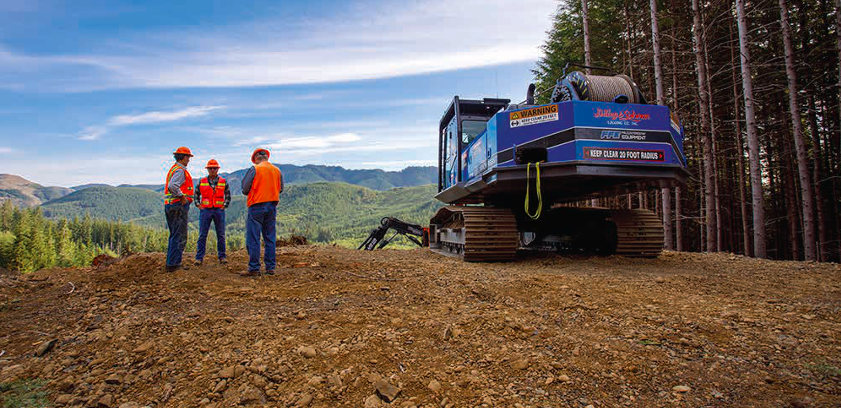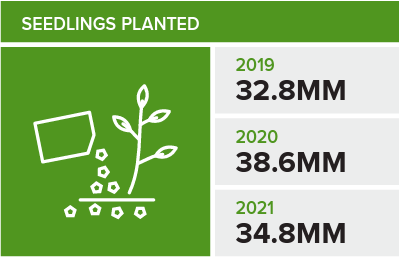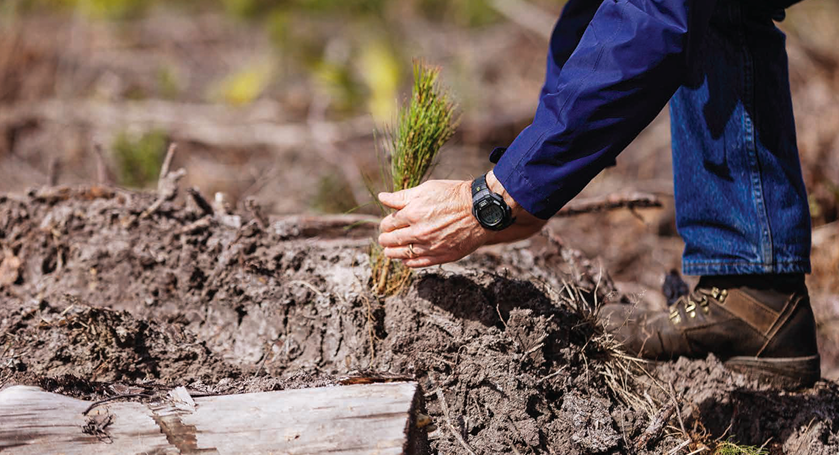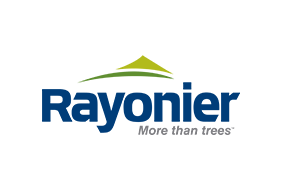Rayonier 2021 Sustainability Report: Sustainable Forest Management
Published 09-19-22
Submitted by Rayonier

Rayonier 2021 Sustainability Report
Sustainable forest management involves a perpetual cycle of planting trees, allowing those trees to grow, harvesting those trees for use in various forest products, and then replanting new trees to begin the cycle anew.
Rayonier first commenced a plantation forestry program in the late 1940s, marking the beginning of our perpetual cycle of planting, harvesting, and replanting our forests. Since then, we have planted well over one billion trees, and that number continues to grow, with more than 34 million additional seedlings planted in the U.S. and New Zealand in 2021.
Research and Development
Rayonier operates an in-house research and develop ment effort designed to provide the knowledge, tools, and technology necessary to manage our forests sustainably and to implement effective silviculture programs (i.e., programs to improve the growth and cultivation of trees) across our ownership. Rayonier maintains active research initiatives in the following key areas: (1) genetics and tree improvement, (2) soils and seedling production, (3) biometrics and growth/yield, (4) environmental sustainability (includ ing protection of water, biodiversity, and threatened and endangered (T&E) species), and (5) carbon and climate impact.
In addition to our in-house research efforts, we also collaborate on specific research initiatives with industry associations, other individual industry participants, and university/industry cooperatives. In the U.S., Rayonier is a member of over 30 university/industry cooperatives, which provide us with access to a wide range of basic and applied research programs to support our forest management efforts. In New Zealand, Rayonier staff actively participate in several Forest Owners Association governance and technical committees covering both research and forest health. We also collaborate with the University of Canterbury on a broad range of forest research matters.

Tree Improvement and Forest Health
A continuous process of research, genetic selection, breeding, and testing enables Rayonier to incrementally improve the productivity and value of our forests over successive rotation cycles. We employ conventional tree breeding techniques, such as controlled polli nation, and do not plant seedlings that are classified as Genetically Modified Organisms (GMOs). Our tree improvement research efforts are primarily focused on identifying and breeding tree families that grow larger, straighter, and faster, while at the same time having improved timber qualities. Our program is designed to enhance disease and pest resistance through careful genetic selection and site-specific silvicultural applications.
We also conduct research to identify more effective silvicultural treatments to increase the survival and growth of the trees we plant. As part of this research, we continually monitor forest conditions for invasive species, weed competition, tree survival rates, soil conditions, and pests. We apply herbicides only where and when needed to control competing vegetation as part of our site-specific forest management oper ations. Our selection of any such treatment is based on specific site needs as well as the safety and efficacy of any herbicide to be used.
Our research and development programs focus not only on current forestry conditions but also analyze the long-term impacts of climate change and its potential impact on our business. This includes evaluating anticipated changes in weather patterns across regions to assess the potential impacts to long-term forest health and productivity.
LEARN HOW FORESTERS PREPARE LAND FOR PLANTING PINES IN THE SOUTHEAST.

Harvest Planning
Rayonier relies on our in-house analytical expertise with wood flow models and other harvest planning tools to guide our long-term planning as well as our estimates of sustainable yield. We define sustainable yield as the annual harvest level that we believe can be sustained into perpetuity based on measurements of biological growth and the expected productivity resulting from our reforestation and silviculture efforts. Our long-term harvest plans, from which we derive our sustainable yield estimates, typically span 60 years in the U.S. South and New Zealand, and 100 years in the U.S. Pacific Northwest.
Underscoring our commitment to managing our forests on a sustainable basis, we disclose our annual sustainable yield for each of our three primary timber operating segments. In 2021, we generated total harvest volume of 10.0 million tons2, which was slightly below our estimated sustainable yield range of 10.3–11.1 million tons2,3 due to weather and transportation constraints encountered during the year. Our 2021 harvest volume included final harvests on approximately 95,000 acres, or 3.5% of our total acreage. Our sustainable yield, as well as our overall harvest strategy, are reviewed annually by our Board.
All of our harvest activities are conducted pursuant to a detailed harvest plan, which specifies harvesting equipment, best management practices, streamside buffers, stream crossing locations, water control, and other regulatory requirements. Our harvest plans also establish buffers around any known or identified T&E species habitats and modify activity timing as necessary to avoid disrupting certain species during their respective breeding seasons.
We strongly oppose illegal logging and deforestation and view these activities as counter to our focus on sustainable forest management. In the U.S. and New Zealand, illegal logging is strictly prohibited, and we are audited to ensure compliance with relevant laws and reg ulations as part of our third-party certification process.
SOIL QUALITY
Soil quality is imperative to the long-term health and productivity of our forests, impacting the biodiversity of our timberlands as well as the overall ecosystem.
Across our operations, our best management practices are designed to minimize soil disturbance and erosion, as well as prevent sediment from entering waterways during forest management activities. We have made significant investments in soil mapping for large portions of our acreage, which includes data on soil horizons, texture, and drainage class. Our accumulated knowledge of soil properties, including the need for nutritional enhancements, enables Rayonier to fine-tune application rates and seasonal timing to improve tree growth and minimize the potential for off-site movement.
Our foresters use our knowledge of geology and soils to guide management practices for each stand of trees over the rotation cycle. In the U.S. South, our rotation ages typically range from 21 to 28 years2 for pine plan tations and from 35 to 60 years2 for natural stands. In the Pacific Northwest, our rotation ages typically range from 35 to 50 years2, and in New Zealand, from 24 to 34 years2. Rotation ages vary based on a wide variety of factors, including species, topography, elevation, soil quality, and precipitation.
Read the full 2021 Sustainability Report.
2 Disclosed in Rayonier’s Annual Report on Form 10-K.
3 Sustainable yield is defined in Rayonier’s Annual Report on Form 10-K. The sustainable yield excludes “look-through” acres in the Timber Funds business.

Rayonier
Rayonier
Rayonier (NYSE:RYN) is a leading timberland real estate investment trust with assets located in some of the most productive softwood timber growing regions in the United States and New Zealand. We own or lease under long-term agreements approximately 2.8 million acres of timberlands located in the U.S. South, U.S. Pacific Northwest and New Zealand. We are More than trees because we recognize that our 90+ years of success in the timberland industry comes from our people, an empowering culture and the courage to constantly challenge “the way it’s always been done.” Get to know us at www.rayonier.com.
More from Rayonier

